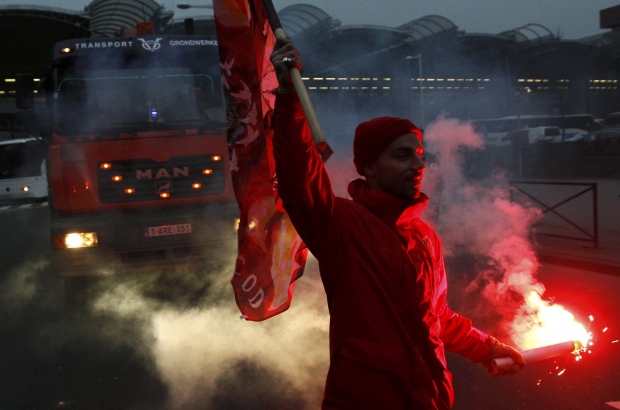- Daily & Weekly newsletters
- Buy & download The Bulletin
- Comment on our articles
National strike planned for December 15
The three main trade unions have called for a general strike for Monday, December 15, in protest at spending cuts planned by the new federal government accord under prime minister Charles Michel.
The unions are angry at what they described in a statement as a governing accord “full of blind cuts that will drain social security dry, bring public services to a standstill, destroy our purchasing power and cost us jobs.”
The details of the December strike are not yet clear, but all public sector unions are planning to take part, as will the railways. Before that, three smaller actions will be carried out in the provinces. Limburg and Antwerp will see many public and private services shut down on November 24, while East and West Flanders will see the same on December 1 and Flemish Brabant and Brussels on 8 December.
The last national strike took place in January 2012, also in protest at government spending cuts, that time from the recently installed socialist-led government of Elio Di Rupo.
“People start their lives with cuts, and end them with cuts,” commented Rudi De Leeuw, secretary-general of the socialist union ABVV. “It is our moral duty to organise resistance. There is no alternative.”
Flemish chamber of commerce Voka said it was “incomprehensible” that the unions are rejecting the overtures of the government. “The ink on the accord is barely dry, and it’s clear the government wants to take a number of matters under consideration together with the unions and employers,” said Voka managing director Jo Libeer. “It simply makes no sense that they should reach for their most drastic weapon at this early stage and threaten to bring the nation to its knees.”
Bewilderment was also the reaction of Unizo, the organisation that represents the self-employed. Chair Karel Van Eetvelt said that the unions “are resisting a number of government measures but are making the problem worse, which will only make the effect of the measures harder”.
Unions had rejected talks in the summer with those forming the government and are now rejecting talks again, continued Van Eetvelt. “They’re saying: let’s hit the economy even harder. I fear the goal might be to cause the fall of the government.”
Christine Mattheeuws, chair of the self-employed union NSZ, noted that “what our economy needs most urgently now is co-operation aimed at securing our wealth and welfare.” A general strike, she said, should “be the ultimate weapon, to be used only when all else has failed”.
Photo: The national strike in January of 2012 was the first in two decades
©Yves Herman/REUTERS



















